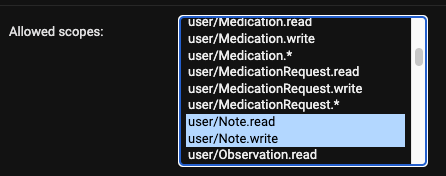Note
This API allows customers to create and update notes. The effect of creating a note is the same as creating a note in the user interface (for example for a note with category “encounter” will create an encounter, a note that is billable will create a claim). Not all note attributes can be modified on update. For example, note type cannot be changed after note creation.
Authentication #
The Note API uses the existing OAuth authentication flow from the FHIR API, so you can simply post to the existing auth token endpoint /auth/token/
New scopes are introduced: user/Note.read and user/Note.write. These scopes will not be in OAuth applications that were created prior to the release of this feature. Therefore to get access, you have two options:
- Create a new OAuth application
- Ask Canvas to add the new scopes to an existing OAuth application

import requests
url = "https://<your-instance>.canvasmedical.com/auth/token/"
payload = 'grant_type=client_credentials&client_id=canvas&client_secret=canvas'
headers = {
'Content-Type': 'application/x-www-form-urlencoded'
}
response = requests.request("POST", url, headers=headers, data=payload)
print(response.text)
Then use your token in the request headers as you do with the FHIR API:

Create #
To create a Note resource, POST to https://<your-instance>.canvasmedical.com/core/api/notes/v1/Note using the supported attributes below. Notes will be created with the state “NEW” by default.
Attributes #
title text
The user-defined title of the Note.
encounterStartTime datetime
The datetime of the encounter. This will display in the datetimeOfService.
patientKey text
The unique key of the Patient for which this Note is written.
providerKey text
The unique key of the Provider staff who is writing the Note.
practiceLocationKey text
The unique key of the PracticeLocation for which this Note is written.
noteTypeName text
Represents the note type in a human-readable format.
noteTypeSystem text
Defines a coding system for the note type, to be used with the paired noteTypeCoding.
noteTypeCoding text
Defines a code for the note type, to be used with the paired noteTypeSystem.
Example #
import requests
import json
url = "https://<your-instance>.canvasmedical.com/core/api/notes/v1/Note"
payload = json.dumps({
"title": "Some Custom Title",
"noteTypeName": "Office visit",
"patientKey": "8d84776879de49518a4bc3bb81d96dd4",
"providerKey": "5eede137ecfe4124b8b773040e33be14",
"practiceLocationKey": "c67e0c59-d4d2-428c-bc13-b6e85d181ad0",
"encounterStartTime": "2023-11-28T19:00:00.016852Z"
})
headers = {
'Authorization': 'Bearer HqFtbSnBNX4S65VhRrg8sRxO6XcSFp',
'Content-Type': 'application/json'
}
response = requests.request("POST", url, headers=headers, data=payload)
print(response.text)
Read #
To read a Note resource, request a GET from
https://<your-instance>.canvasmedical.com/core/api/notes/v1/Note/{noteKey}
Attributes #
noteKey string
The unique key of the Note.
title text
The user-defined title of the Note.
datetimeOfService datetime
The datetime of the service, as defined as encounter start time for encounters, appointment datetime for appointments, or the created datetime for other note types.
titleDisplay text
Represents the computed title of the Note, as displayed in the UI. If a user-defined title is not provided, this defaults to other display logic.
currentState text
The most recent state of the Note.
patientKey text
The unique key of the Patient for which this Note was written.
providerKey text
The unique key of the Provider staff who wrote the Note.
practiceLocationKey text
The unique key of the PracticeLocation for which this Note was written.
noteTypeName text
Represents the note type in a human-readable format.
noteTypeSystem text
Defines a coding system for the note type, to be used with the paired noteTypeCoding.
noteTypeCoding text
Defines a code for the note type, to be used with the paired noteTypeSystem.
Example #
import requests
url = "https://<your-instance>.canvasmedical.com/core/api/notes/v1/Note/4a6064e9-293c-4541-b1cc-515f81435e74"
payload = ""
headers = {
'Authorization': 'Bearer QdPhY9QLIs4zlawv5UG42JDASGqX0l'
}
response = requests.request("GET", url, headers=headers, data=payload)
print(response.text)
Update #
To update an existing Note resource, PATCH to
https://<your-instance>.canvasmedical.com/core/api/notes/v1/Note/{noteKey}
using any of the following allowed attributes.
Attributes #
title text
The user-defined title of the Note.
providerKey text
The unique key of the Provider staff who is writing the Note.
practiceLocationKey text
The unique key of the PracticeLocation for which this Note is written.
stateChange text
The new note state to be set. Allowed transitions in v1 include:
Locking an unlocked note (excluding DATA notes). Locking a note will result in the Note PDF being generated along with it associated FHIR DocumentReference record.
“ULK” → “LKD”, “NEW” → “LKD”, “CVD” → “LKD”
Unlocking a locked note (excluding DATA notes)
“LKD” → “ULK”
Marking an appointment as a no show
“BKD” → “NSW” & “RVT” → “NSW”
Checking in an appointment
“BKD” → “CVD”, “NSW” → “CVD”, “RVT” → “CVD”
Example #
import requests
import json
url = "https://<your-instance>.canvasmedical.com/core/api/notes/v1/Note/4a6064e9-293c-4541-b1cc-515f81435e74"
payload = json.dumps({
"stateChange": "LKD",
"providerKey": "4150cd20de8a470aa570a852859ac87e",
"practiceLocationKey": "c67e0c59-d4d2-428c-bc13-b6e85d181ad0",
"title": "New Custom Title"
})
headers = {
'Authorization': 'Bearer QdPhY9QLIs4zlawv5UG42JDASGqX0l',
'Content-Type': 'application/json'
}
response = requests.request("PATCH", url, headers=headers, data=payload)
print(response.text)
Search #
To search for Note resources, request a GET from
https://<your-instance>.canvasmedical.com/core/api/notes/v1/Note
and append your search criteria as URL parameters.
Query Params #
patient_key text filters to this patient’s notes only
provider_key text filters to this provider’s notes only
note_type_name text filters to this type of note (human-readable)
note_type_system and note_type_coding text filters to this type of note with system/code pair
datetime_of_service datetime filters the service datetime with the following options:
- = (exact)
- lte (less than or equal to)
- gte (greater than or equal to)
- lt (less than)
- gt (greater than)
&datetime_of_service__gte=2023-12-06T19:10:56.115532Z
Pagination #
To paginate your requests, simply add a limit query parameter, e.g. GET from https://<your-instance>.canvasmedical.com/core/api/notes/v1/Note?limit=10. You can also page through the results with the offset parameter, e.g. https://<your-instance>.canvasmedical.com/core/api/notes/v1/Note?limit=10&offset=10. The response will include a record count, as well as next, and previous URLs for convenience, and the note data will be contained in the results value.
Ordering #
To order your results, simply add an ordering query parameter, e.g. GET from https://<your-instance>.canvasmedical.com/core/api/notes/v1/Note?ordering=datetime_of_service. To reverse the sort order, prepend the field with a hyphen, e.g. ?ordering=-datetime_of_service. Available ordering fields include:
- created (the datetime the note was created)
- modified (the datetime the note was last updated)
- datetime_of_service (the datetime of the actual service associated with the note)
Example #
import requests
url = "https://<your_instance>.canvasmedical.com/core/api/notes/v1/Note?patient_key=8d84776879de49518a4bc3bb81d96dd4¬e_type_name=Office%20visit"
payload = ""
headers = {
'Authorization': 'Bearer QdPhY9QLIs4zlawv5UG42JDASGqX0l'
}
response = requests.request("GET", url, headers=headers, data=payload)
print(response.text)